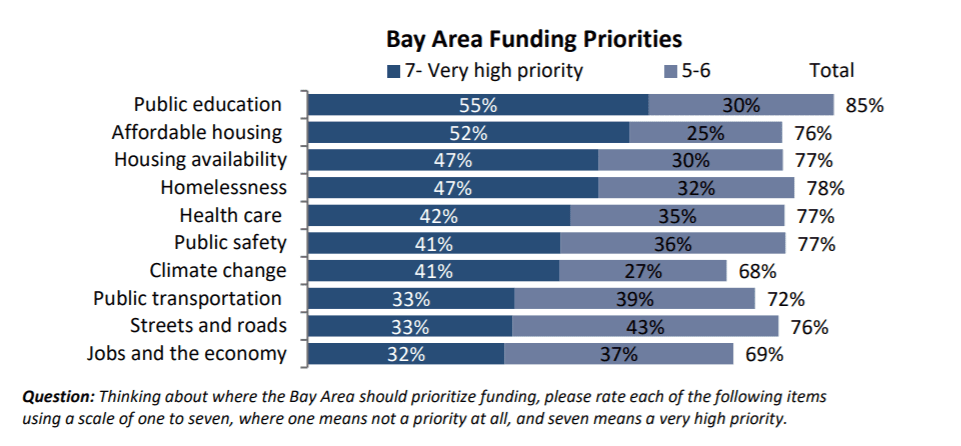A new poll found that Bay Area voters are receptive to taxing themselves — again — to make a dent in the region’s affordable housing crisis.
A survey conducted by EMC Research found that most Bay Area voters support regional tax measures to invest in affordable housing, particularly in general obligation bonds or sales tax revenue.
According to the Housing Production, Preservation and Protection Coalition, the poll was conducted to gauge the opinions of Bay Area residents on the region’s intractable housing crisis.
The poll surveyed 1,935 Bay Area residents on the costs and availability of housing, their fear of being forced to flee the Bay Area and their potential support for a dedicated housing measure addressing these issues.
The poll found that 82 percent of respondents are worried about low-income families finding affordable housing. Seventy-nine percent of renters are concerned about finding affordable housing for themselves — the same percentage of respondents fear that they might be forced out of the Bay Area because of rising costs.
According to the report, the polling “…showed a considerable voter appetite for a dedicated housing measure… well over at or near the two-thirds threshold needed for voter approval.”
The poll was released last week just before the Assembly Local Government Committee was set to consider Assembly Bill 1487, which would create the Housing Alliance for the Bay Area (HABA), an entity which would place funding measures on the ballot to raise revenue for local strategies to combat the current housing shortage.
Authored by Assemblyman David Chiu, the San Francisco legislator described the bill as a three-pronged approach.
The revenue from the tax measure or bond would focus on creating affordable housing, preserving the affordability of existing housing options and helping tenants facing eviction.
HABA would be the first public entity in the Bay Area focused entirely on the region’s housing needs.
“An overwhelming majority of Bay Area residents support bold, regional action to address our housing crisis,” Chiu said in a statement. “By creating the first regional body focused on addressing the Bay’s housing needs, we can take a significant step towards a more affordable and equitable Bay Area.”
AB 1487 recently passed its second Assembly hearing with minor amendments regarding the governance structure of HABA.
After the bill clears the Assembly, it will go through two Senate committees and a floor vote before reaching the governor’s desk.
 If the bill is adopted, HABA could place new funding measures on the ballots of the nine Bay Area counties. Santa Clara County already adopted Measure A in 2016, a $950 million affordable housing bond for affordable housing.
If the bill is adopted, HABA could place new funding measures on the ballots of the nine Bay Area counties. Santa Clara County already adopted Measure A in 2016, a $950 million affordable housing bond for affordable housing.
Each ballot would include one or more of the following: A parcel tax, commercial development fees, gross receipts tax, employee tax, sales tax and general obligation and revenue bonds. The resulting revenue generated would be used for the construction of new affordable housing, preservation of existing affordable housing and tenant protection programs.
Remaining funds would be made available for local jurisdictions if they achieve certain affordable housing benchmarks established by HABA.
 “For something like (HABA) to work, we need to have significant streams of tax revenue from around the Bay Area,” said Matt King, organizing director at Sacred Heart Community Service. “There are many jurisdictions in the nine counties. Every single one plays by a different set of rules. We need to take steps to force everyone to step together to raise money for everybody to have their right of housing.”
“For something like (HABA) to work, we need to have significant streams of tax revenue from around the Bay Area,” said Matt King, organizing director at Sacred Heart Community Service. “There are many jurisdictions in the nine counties. Every single one plays by a different set of rules. We need to take steps to force everyone to step together to raise money for everybody to have their right of housing.”
Housing affordability and availability ranks among the highest of Bay Area voters’ funding priorities, the poll found, just below public education and right above homelessness. With 28 percent of the population being homeless, the Bay Area has the third highest rate of homelessness in the nation, just behind New York and Los Angeles.
“What happens in one city really affects the rest of the region,” said Jen Kwart, a spokeswoman for Chiu. “There isn’t a single entity focused on the housing crisis in the Bay Area regionally. That is what [HABA] would accomplish.”
Contact San José Spotlight intern Yale Wyatt at [email protected] or follow @yalewhat on Twitter.



Leave a Reply
You must be logged in to post a comment.